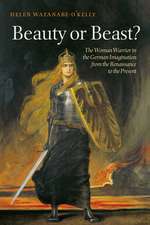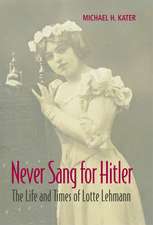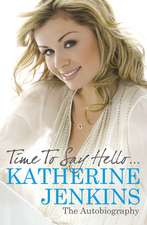Opera after 1900: The Ashgate Library of Essays in Opera Studies
Editat de Margaret Notleyen Limba Engleză Paperback – 14 oct 2024
| Toate formatele și edițiile | Preț | Express |
|---|---|---|
| Paperback (1) | 227.15 lei 6-8 săpt. | |
| Taylor & Francis – 14 oct 2024 | 227.15 lei 6-8 săpt. | |
| Hardback (1) | 1057.26 lei 6-8 săpt. | |
| Taylor & Francis – 28 ian 2011 | 1057.26 lei 6-8 săpt. |
Preț: 227.15 lei
Preț vechi: 251.65 lei
-10% Nou
Puncte Express: 341
Preț estimativ în valută:
43.47€ • 45.22$ • 35.89£
43.47€ • 45.22$ • 35.89£
Carte tipărită la comandă
Livrare economică 14-28 aprilie
Preluare comenzi: 021 569.72.76
Specificații
ISBN-13: 9781032918914
ISBN-10: 1032918918
Pagini: 538
Dimensiuni: 174 x 246 mm
Greutate: 1 kg
Ediția:1
Editura: Taylor & Francis
Colecția Routledge
Seria The Ashgate Library of Essays in Opera Studies
Locul publicării:Oxford, United Kingdom
ISBN-10: 1032918918
Pagini: 538
Dimensiuni: 174 x 246 mm
Greutate: 1 kg
Ediția:1
Editura: Taylor & Francis
Colecția Routledge
Seria The Ashgate Library of Essays in Opera Studies
Locul publicării:Oxford, United Kingdom
Public țintă
AcademicCuprins
Contents: Introduction; Part I Operas by Viennese Composers, ca. 1910-1935: Expressive principle and orchestral polyphony in Schoenberg's Erwartung, Carl Dahlhaus; 'Die Frauenfrage' in Erwartung: Schoenberg's collaboration with Marie Pappenheim, Elizabeth L. Keathley; A Florentine Tragedy, or woman as mirror, Sherry D. Lee; Schoenberg as Moses and Aron, Joseph Auner; Berg's Propaganda pieces: the 'Platonic idea' of Lulu, Margaret Notley. Part II Operas from Other European Contexts: The Verbunkos and Bartók's modern style: the case of Duke Bluebeard's Castle, Judit Frigyesi; Hans Pfitzner's Palestrina and the impotence of early lateness, Stephen McClatchie; Ariadne, Daphne and the problem of Verwandlung, Bryan Gilliam; The concept of epic opera: theoretical anomalies in the Brecht-Weill partnership, Stephen Hinton; French identity in flux: the triumph of Honegger's Antigone, Jane F. Fulcher; Back to the future: Shostakovich's revision of Leskov's 'Lady Macbeth of Mtsensk District', Caryl Emerson. Part III Operas by Britten and Birtwistle: 'Peter Grimes': the growth of the libretto, Philip Brett; 'Twisted relations': method and meaning in Britten's Billy Budd, Arnold Whittall; Why does Miles die? A study of Britten's The Turn of the Screw, Clifford Hindley; The shadow of opera: dramatic narrative and musical discourse in Gawain, David Beard. Part IV Operas Composed in the United States: Porgy and Bess: 'an American Wozzeck', Christopher Reynolds; Kurt Weill, modernism, and popular culture: Öffentlichkeit als Stil, Kim H. Kowalke; The best of all possible worlds: the Eldorado episode in Leonard Bernstein's Candide, Elizabeth B. Crist; The great American opera: Klinghoffer, Streetcar, and the exception, Lawrence Kramer; Instrumental dramaturgy as humane comedy: What Next? by Elliott Carter and Paul Griffiths, Anne C. Shreffler; Name Index.
Notă biografică
Margaret Notley, University of North Texas, Denton, USA
Descriere
This volume reprints articles that cover an array of significant twentieth-century operas and critical questions about them. The anthologized articles are organized according to the place of origin of the operas discussed in each of them. In contrast, the introduction follows a thematic approach and considers questions of genre and reception; persp


















